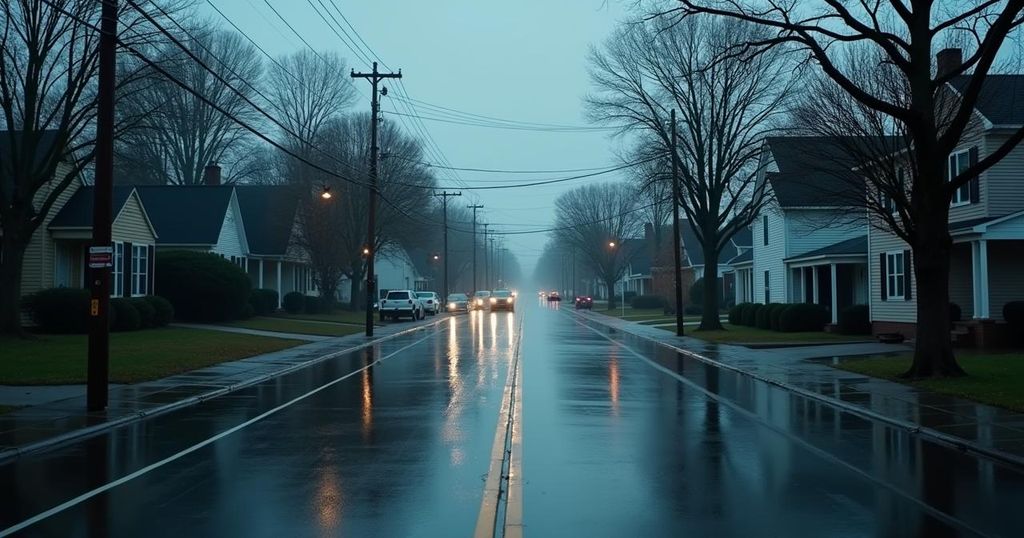Communication Struggles in the Wake of Hurricane Helene in North Carolina
Hurricane Helene has caused catastrophic flooding in North Carolina, resulting in significant loss of life and widespread communication challenges. The aftermath reveals extensive damage to infrastructure and homes, and as recovery efforts continue, residents grapple with the impact on their community fabric and economy.
On a clear and cool Sunday, the North Carolina mountains revealed the extensive devastation wrought by Hurricane Helene, which, having made landfall in Florida as a Category 4 storm, caused catastrophic flooding across several states, including North Carolina. The small towns in western North Carolina are facing significant challenges in the aftermath of this disaster. In the wake of the storm, communication has become a major obstacle, with many residents struggling to connect with loved ones due to spotty cellphone and internet service. County Manager Avril Pinder reported over 1,000 inquiries from residents seeking information about their missing relatives. Car lines gathered near functioning gas stations, with individuals venturing on foot carrying gas cans and water jugs. The combined death toll across five affected states stands at least 61, with North Carolina reporting 10 fatalities. However, concerns persist regarding the potential for further casualties as ongoing communication difficulties obscure the true extent of the situation. Access to critical infrastructure remains compromised, with over 400 roads closed, including parts of major interstates. Fire Chief Anthony Penland of Swannanoa reported that areas within his jurisdiction have been completely devastated, with neighborhoods unrecognizable and in shambles. Rescue efforts are hindered by the inaccessible conditions of affected areas, though search-and-rescue teams have been mobilized, acknowledging the grim possibility that some areas may no longer exist. Despite the rain having eased, flood alerts remain active due to continuous runoff, with the National Weather Service predicting additional rainfall from the remnants of Helene that could exacerbate conditions. In western North Carolina, concerns about subsequent flooding from saturated soils linger, although expected rain amounts are predicted to be minimal. In towns like Asheville, residents witnessed their vibrant communities transformed as the river encroached on park areas, streets, and businesses. The devastation left businesses submerged and covered in mud, leading community members to reflect on their shared memories in these familiar places. Artists and citizens alike document the flooding, as they grapple with the impact on local culture and economy. Hope remains that the community spirit will endure and that cherished local businesses will recover. As the region recovers from this overwhelming tragedy, the enduring challenges of communication and the daunting task of rebuilding weigh heavily on the minds of those affected.
Hurricane Helene, which recently struck the United States southeastern coastline, has caused significant flooding and destruction in several states, particularly in North Carolina. The impact of severe weather events like hurricanes has been a growing concern as climate patterns change, leading to an increased frequency and intensity of such natural disasters. This has led to a heightened emphasis on emergency preparedness and the importance of establishing reliable communication channels during and after catastrophic events. The need for effective response strategies in the wake of environmental crises has become paramount to ensure community resilience and recovery.
In summary, the aftermath of Hurricane Helene highlights the severe challenges faced by communities in North Carolina, particularly regarding communication and infrastructure. The extent of the flooding has resulted in tragic casualties and extensive damage to neighborhoods, prompting urgent search-and-rescue efforts. As additional rainfall looms on the horizon, the ongoing resilient spirit of the affected communities remains crucial for recovery efforts. The experiences shared by residents remind us of the profound impact such natural disasters have on individual lives, local businesses, and the cultural identity of these regions.
Original Source: www.washingtonpost.com




Post Comment